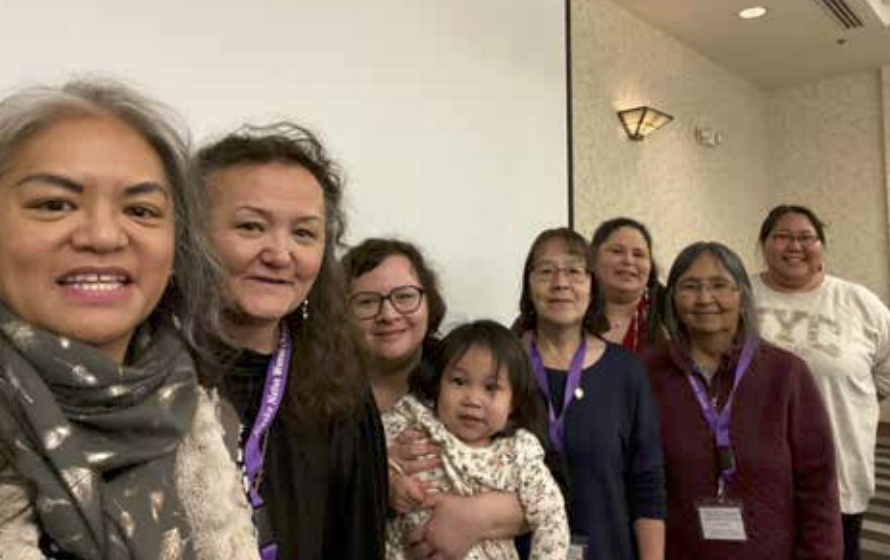The Medicine of Advocate Organizer Training for the Safety and Healing of Alaska Native Women and Future Generations
The Alaska Native Women’s Resource Center (AKNWRC), in their commitment to nurturing Village-based, Tribal advocacy, hosted a 40-hour pilot advocate training on the land of the Dena’ina (Anchorage, AK) for advocates across the state in February. This training was funded by the Office on Violence Against Women. It was guided by a Steering Committee of Alaska Native Advocate Organizers, who have been advocates and mentors to rural and urban communities for decades. Advocacy training developed by and for the occupying cultural majority generally focuses on behavioral dynamics in relationships and does not acknowledge the history or the source of the unprecedented rates of violence Alaska Native women experience compared to non-Alaska Native women. The AKNWRC pilot training was the first ever training that centered on the well-being and advocacy of Alaska Native women healing from violence (domestic violence and sexual assault) from the perspective of Alaska Native history and Alaska Native values and world views. Advocate attendees and Elders of the training were invited to provide feedback to further shape and improve this training for future advocates.
Twenty-nine advocate participants completed a survey that captured the communities served, their role as advocates, years of experience, suggestions, and feedback on future training, and the impact of the training on their confidence as advocates. Except for one attendee, all attendees were women. The advocates present served the following communities: Emmonak, Nenana, Pilot Station, Port Heiden, Pitka’s Point, Buckland, Juneau, Craig, Hydaburg, Kasaan, Angoon, Huslia, Igiugig, Dena People of the Lower Tanana River (Fairbanks Interior), Marshall, Mountain Village, Koyukuk, Tanana, Kipnuk, and Dena’ina (Anchorage).

With the National Indigenous Women’s Resource Center (NIWRC), Paula Julian has walked alongside the AKNWRC to develop this training and other components of organizing a sustainable Indigenous women’s resource center. As a practicum student working with the AKNWRC, I was invited to attend the training to observe attendee experiences, and incorporate feedback collected from attendees. I hope to shine a light on the heart and spirit of AKNWRC, the Advocate Organizers, and the Tribal advocates who gathered for this training. This article is offered as a gift so that other Indigenous communities may steward safety and healing in culturally appropriate and sustainable Indigenous ways.
As with our Indigenous relatives around the world, Alaska Native women continue experiencing unrelenting violence that is traced back to early colonizers of what is known as the United States. The AKNWRC and the Advocate Organizers affirm that an advocate’s role in the community is to promote the safety and healing of women and help women restore Alaska Native protections. An advocate can also recognize opportunities to collaborate with others to reform and transform existing responses and systems to remove systemic barriers to Alaska Native women’s safety. The role of the Tribal advocate is unique in these ways.
The role of a Tribal advocate is also complex. Upon request and consent of victim-survivors, Tribal advocates collaborate with Tribal, state, and federal agencies toward safety, healing, and justice for Alaska Native women victimized by domestic violence or sexual assault. Tribal advocates work with these systems to fortify a just and efficient system that reflects Alaska Native values and honors the healing power of Alaska Native culture.
The AKNWRC Advocate Training recognized that Tribal advocacy work has a bidirectional impact. Commonly, Tribal advocates are themselves direct or indirect victims of violence. When we, as advocates, engage in the safety and healing of our sisters in crisis from violence, we also heal as advocates. As Tribal advocates, our advocacy is fluid. Tribal advocacy reaches beyond the walls of a formal advocacy center as we attend to survivors who are our relatives and members of our tightly woven community as sisters, daughters, in-laws, cousins, nieces, and granddaughters. The warmth of Tribal advocacy radiates beyond the constraints of funding to help relative-survivors, and is not exclusively defined by state and federal protocols, policies, or laws. Tribal advocates embody compassion and the Alaska Native value of presence as a human being with one another, being and modeling relational harmony and connectedness.
The AKNWRC Advocate Training offered a safe space for healing to happen. In small circles, advocates were moved to cry and share personal experiences of sexual violence that they had not shared before and about the vulnerability and difficulty of helping a close friend who survived an assault. As a large group, Tribal advocates were invited to participate in a smudging ceremony to help cleanse the heavy and deeply personal energy of the topic of violence against Alaska Native women and gathered for the singing of two traditional songs. Acknowledging that engaging in cultural practices restores Tribal sovereignty, Tribal advocates at the AKNWRC training shared cultural activities they found helpful in sustaining their healing journey, including beading, Alaska Native dancing and singing, being outdoors, spending time with friends gathering berries, being in nature.
Tribal advocacy extends to responding as relatives and deepening our understanding of advocate responsibilities to each other as relatives, which are reflected in Alaska Native languages and cultural teachings with love, care, and compassion. Tribal advocacy includes compassion and healing for those who commit abuse/violence, and it promotes growth and healing that aligns with Alaska Native perspectives on being a human being. Advocates and Elders at this training observed that we, Alaska Native People, are more than our trauma history, we are not defined by trauma. During the training, Yup’ik Elder Elsie Boudreau requested that this truth be shared as an advocate statement. Our legacy as Alaska Native People is our ability to adapt and persevere as our ancestors did, and our future generations will. Our legacy is strength through our culture and our togetherness. By uniting in their strength and vulnerability, advocates have liberated their voice, thus bringing to fruition a vision: This collective statement. This collective unity has resulted in a stronger force that enables us and future generations to stand together.





